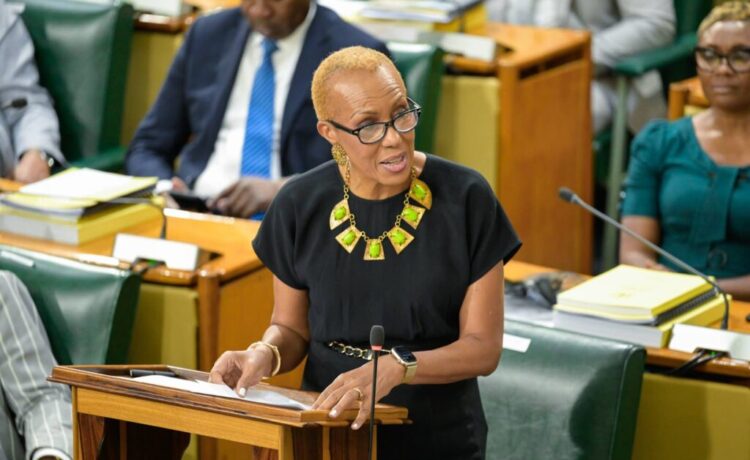Finance Minister Fayval Williams tabling the 2025/26 Estimates of Expenditure in the House of Representatives on Thursday, February 13, 2025. (Photo: JIS)
FINANCE Minister Fayval Williams is defending the Government’s $1.26-trillion budget proposal for fiscal year 2025/26, explaining that the 9.1 per cent reduction from the previous year’s revised $1.38-trillion budget is largely due to a significant $159.4-billion decline in debt servicing costs. This decrease, Williams argues, has freed up resources to prioritise critical sectors such as education and health care.
However, critics argue that when adjusted for inflation, the budget represents a real-term contraction of approximately 14 per cent, raising concerns about its broader implications.
Williams emphasised that the reduction reflects a deliberate effort to manage debt obligations more effectively while redirecting funds to areas with the greatest social impact.
“This is a positive development for Jamaica’s economic health,” Williams said. “Historically, our national budget was heavily burdened by interest payments on debt. Today, thanks to prudent fiscal management, interest expenses as a percentage of tax revenues have fallen from 33.6 per cent in 2014/15 to just 18.7 per cent in 2025/26.”
Williams emphasised that the savings from reduced debt obligations have enabled the Government to maintain strong funding for critical areas. The Ministry of Education remains one of the largest recipients of the budget, with an allocation of $183.52 billion, alongside significant funding for health care and national security. These investments reflect the Government’s commitment to improving quality of life and fostering sustainable development.
Capital expenditure is set at $62.59 billion, consistent with last year’s revised figures, ensuring continued support for infrastructure projects and other key initiatives despite overall fiscal adjustments.
Opposition spokesman on finance Julian Robinson had criticised the Government for failing to spend nearly $19 billion of last year’s capital budget, arguing that this contributed to economic stagnation amid two consecutive quarters of GDP contraction. While acknowledging these challenges, Williams reaffirmed that the current fiscal strategy prioritises resilience and long-term stability over short-term spending increases.
“Our fiscal strategy remains focused on growth and resilience,” she said. “By reducing our debt burden we are strengthening Jamaica’s economic stability and improving our ability to respond to global financial changes and external shocks.”
Williams encouraged stakeholders and citizens to review the full fiscal documents to gain a clearer understanding of the Government’s priorities and strategies. She stressed that Jamaica’s ability to maintain a trillion-dollar budget, despite global economic pressures, demonstrates resilience and sound policymaking.
The budget will next be reviewed by Parliament’s Standing Finance Committee before debate begins on March 11. The Government aims to pass it by March 31, ahead of the new fiscal year starting on April 1.
While concerns about economic contraction remain in some quarters, Williams’ response positions the budget as part of a broader strategy aimed at securing Jamaica’s long-term growth and stability through disciplined fiscal management.
















